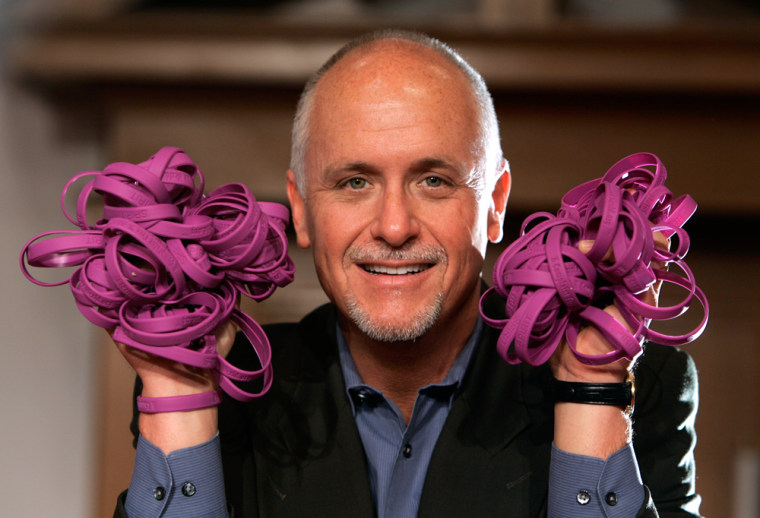The Rev. Will Bowen tries not to complain. He wants everyone else to stop carping, too — all 6 billion of us on the planet.
And his message, first preached in a sermon at his small suburban church, has caught on — even though some critics note complaining serves an important function.
Last July, Bowen challenged worshippers at Christ Church Unity to quit complaining as a way to bring more prosperity into their lives. The congregation is part of the Association of Unity Churches, which offers what it calls “practical Christianity” — a way of life leading to health, prosperity, happiness and peace of mind.
“When you’re focusing your attention on what’s wrong or complaining, you’re going to get more of what you’re complaining about,” Bowen says.
Positive thinking isn’t a new concept, but Bowen’s spin came with a contemporary twist: the silicone bracelet. At the July sermon, Bowen handed out about 250 purple bracelets he wanted his congregants to use to remind themselves to stop complaining, criticizing or gossiping. Sarcasm was another no-no.
Challenge: 21 days with no griping
He challenged them to refrain from complaining for 21 days because, he said, that’s how long it takes to break habits. Whenever they found themselves failing they were to switch the bracelet to the other wrist and start over.
“Complaining draws all of its essence from negativity,” the 47-year-old Bowen says. “When you complain, you do it typically to attract attention or sympathy. It’s you saying, ‘There’s something wrong with me.’
“You’re sending out this vibrational energy into the universe that you’re a victim, and the universe responds with more negativity.”
Bowen thought the challenge would be easy for him since he’s a “positive minister guy.” But he broke three bracelets after moving them from wrist to wrist so many times before making his 21 days. It took him nearly three months.
The bracelets and the no-complaining challenge were a hit with church members, who came back looking for more bracelets, which the church gives out free. People at their offices wanted them. Family, friends, students wanted the purple bracelet and to take the 21-day challenge.
Bracelets around the world
By October, reporters came calling. After the initial burst of publicity, the church sent out more than 1 million free bracelets. Requests came in via the church’s Web site from around the world — Russia, South America, Asian countries. Some Pentagon employees began using the bracelets, which they kept on their desks because they weren’t allowed to wear them, says Tom Alyea, a church board member who has been coordinating the no-complaining effort with Bowen.
“When they find themselves complaining, they move the bracelet from one side of the desk to the other,” Alyea says.
But Barbara S. Held, psychology professor at Bowdoin College in Brunswick, Maine, says Bowen’s approach is misguided. Complaining is an important, necessary tool for some people, she said.
“If we lived in a world in which there was nothing to complain about I think it might make perfect sense,” Held says. “But we don’t.”
Held, author of the book “Stop Smiling, Start Kvetching: A 5-Step Guide to Creative Complaining,” says people cope in different ways and some people need to vent. The “the tyranny of the positive attitude in America, which Reverend Bowen wants to spread to the entire world” can actually hurt some people, she says.
Critic: Let people be people
“The research is compelling. When you force people to use a coping style that goes against their nature, their functioning goes down,” she says. “I’m not pushing pessimism. I’m saying let people cope in the way they cope and don’t make them feel defective.”
Still, Bowen’s no complaining mission has resonated widely. He does several interviews a week and gets a lot of questions about what exactly constitutes complaining.
He explains it this way: “Complaining is saying, ‘Man, that sucks.’ What changes things is saying, ’This is not the way I would like it to be. This is how I would like it to be.’ It’s painting a picture or creating a vista to get people to look in that direction. It’s where you want to move toward.”
Bowen attributes his campaign’s appeal to people “being tired of negativity,” and to the changes he says people experience when they move away from complaining. Schools, prisons and homeless shelters have taken up the no complaint challenge, he says.
“When you’re not articulating complaints then they have nowhere to go, and your brain literally stops producing them, and you become a happier person,” he says.
Since Bowen’s appearance on “The Oprah Winfrey Show” in March, volunteers have taken orders for more than 4 million bracelets. They’ve been coming in to the Web site at about 1,000 a day, Alyea says.
Plans for book, holiday
The bracelets are free, but the church includes a donation envelope in each packet it sends out. Alyea has contacted some Web sites that have offered copycat Complaint Free World bracelets but laughs about another site that he says “for $3 will send you a bracelet so you can complain all you want.”
Bowen won’t say how much the bracelets cost the church or what the donations amount to. But so far, contributions are keeping up with costs, he says.
A book, “A Complaint Free World” is due in October, and Bowen’s next goal is a nationwide No Complaining day, preferably the day before Thanksgiving.
Held likely wouldn’t support that idea.
“If they want to stop complaining and be optimistic and look on the bright side, fine,” she says. “But why cram the agenda down everybody’s throat? You don’t see the kvetchers and complainers saying that everybody has to complain.”
